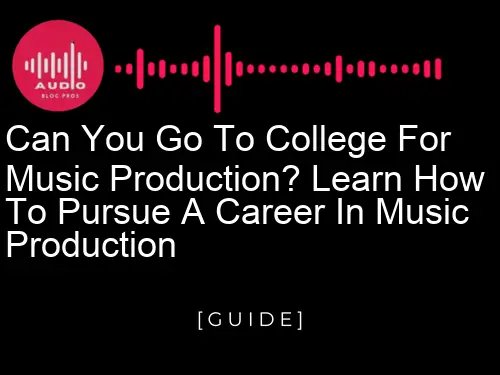Are you passionate about music production? Are you curious if it is possible to pursue a career in music production through college? Can You Go to College for Music Production? If so, then this post is for you. In it, we will discuss the paths available to those looking to gain a formal education in music production. Keep reading and find out all the ways that you can pursue a career in music production and learn how to make your dreams come true.
Table of Contents

Understanding the Basics of Music Production
Music production is a skill that can be learned at any level, but it’s important to consider what kind of training you need in order to pursue a music production career. Whether you’re looking for an entry-level position or want to become a specialist, there are many different types of music production degrees available.
One common way to learn music production is by taking courses at a community college or junior college. However, if you want to pursue a degree in music production, it’s important to look into which schools offer the specific type of training that you’re seeking. Some schools offer programs focused on electronic music production, while others focus on film and audio composition.
If you’re not sure if pursuing a degree in music production is the right path for you, it’s always beneficial to consult with an experienced producer or musician. They can give you tips and advice on what coursework would best suit your skillset and help guide your career options down the road.
Exploring Different Types of Music Production Degrees
Different types of music production degrees can help students learn about different aspects of music production. Some degrees may focus on specific tools or techniques, while others may cover a broader range of topics.
Some popular music production degrees include:
- Audio engineering
- Music theory
- Music production
- Music technology
- Recording engineering
- Songwriting

Choosing the Right College for Music Production
There are many different types of music production degrees out there, so it’s important to choose the right one for you. Here are a few things to consider when choosing a music production degree:
-
What type of music do you want to produce? Some music production degrees focus on producing popular music, while others focus on producing classical or jazz music.
-
Do you have any experience producing music? If not, you may need to take some classes to get started.
-
What type of equipment do you want to use in your studio? Some music production degrees require students to have their own recording equipment, while others allow students to use the equipment at the school’s recording studio.
-
What type of work environment do you want? Some music production degrees are offered in large, commercial studios, while others are offered in smaller studios operated by private individuals or small businesses.
-
How much money are you willing to spend on your education? Some music production degrees are very expensive, while others are less expensive.

Finding Financial Aid and Scholarships for Music Production
Music production is an extremely versatile and in-demand field, with jobs available in a variety of industries. Degrees in music production can provide you with the training and experience you need to pursue a career in music production. However, before you decide to pursue a degree in music production, it is important to understand the basics of this field.
In this section, we will explore different types of degrees that can prepare you for a career in music production. We will also discuss the benefits of pursuing such a degree and outline some key considerations when selecting your college.

Preparing for a Career in Music Production
Researching Music Production Programs
Music production is a growing field with many opportunities. However, before you can pursue a career in music production, you’ll need to research the field and prepare yourself for the challenges that lie ahead.
First, you’ll need to find financial aid and scholarships for music production. Many music production programs offer scholarships and financial aid, so be sure to check out the admissions requirements of the schools you’re interested in.
Second, research the music production industry. Learn about the different types of music production, what skills are necessary for a successful career in music production, and what types of equipment are commonly used in the industry.
Finally, be prepared to work hard. A career in music production is not easy – you’ll need to be creative, reliable, and have a lot of patience. However, with the right preparation and dedication, you can achieve your dream of becoming a music producer.
Gaining Relevant Experience
No matter what you decide to do with your music career, having relevant experience will be important. (For example, if you want to become a music producer, gaining experience recording and mixing tracks is essential.) Fortunately, there are many ways to get the experience you need.
One way to gain experience is by taking music production classes at a college or university. These programs usually have strong curriculums that cover all aspects of music production. Plus, they often offer hands-on learning opportunities, which can help you develop skills in specific areas of production.
If college isn’t for you or you don’t have the time for a full program, there are other options available too. You can find audio editing software online and take basic courses to learn how to use it. (Alternatively, you can find beginner music production courses offered through online universities.)
Whatever route you choose, always make sure to research the available programs carefully before applying. This will help ensure that you choose a program that is best suited for your interests and skills.
Networking in the Music Industry
Networking is an essential skill for anyone looking to pursue a career in music production. Not only will networking help you find talent and job opportunities, but it can also lead to important relationships that could help you achieve your goals. Consider attending industry events, such as live sound recording or mix nights, where you can meet representatives from various companies and gain access to valuable resources. Additionally, be sure to build a strong online presence by publishing blog posts and sharing audio samples on social media platforms. Finally, make sure to keep up-to-date on industry news by subscribing to music industry newsletters or reading music industry blogs.
Developing a Professional Portfolio
There is no one-size-fits-all answer to whether or not you can go to college for music production, as the field of music production is highly specialized and requires years of dedicated study. However, there are a few things you can do to prepare yourself for a career in music production.
First, develop a strong network of contacts in the music industry. Not only will this help you find work as a music producer or audio engineer, but it will also give you access to valuable resources and advice. Second, invest in a quality audio recording and mixing equipment. This will not only allow you to produce high-quality audio recordings, but it will also help you develop sound engineering skills. Finally, develop a professional portfolio that showcases your skills as a music producer and audio engineer. This will help you attract jobs in the music industry, and it will also give you an opportunity to sell your services to other professionals.
Benefits of Pursuing a Degree in Music Production
Upon completing a music production degree, students can find careers in a variety of industries, including music production for film and television, corporate audio productions, publishing companies, or music festivals. While many music production degrees require coursework in recording technology and audio editing software, other degrees may emphasize producing original music or working with soundtracks. Regardless of the type of degree pursued, training in music production provides foundational skills for working in any creative industry.
Music production is a demanding field that requires strong technical skills as well as creativity. College-level courses in music production typically include instruction in recording technology and audio editing software as well as courses on composition and improvisation. In order to build an impressive portfolio of work and stand out from competing candidates during the job interview process, graduates should also take courses in business management and marketing.
The world of music production has so much to offer, and pursuing degrees in the field can definitely be a rewarding experience. There are endless opportunities to learn new skills and explore different aspects of the industry. With the right college and preparation, you could turn your passion into a career. To get started on your journey in this exciting field, check out our other content for more information on music production training programs and resources.

